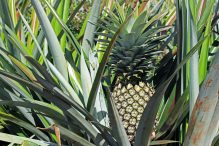
Samoa – Originating in South America, pineapple is now grown all around the world and in the Pacific, we like to think that we produce the sweetest and tastiest pineapples there are. Whether you think they are the best or not, there is no arguing with the fact that Pacific pineapples are great!
However, there has been a problem that in many Pacific countries, pineapples are not available all year round. There is a natural pineapple season and left to themselves, the pineapples will all produce fruit at roughly the same time. Wouldn’t it be better for consumers to be able to enjoy eating pineapple all year round? And wouldn’t this year-round production be more profitable for farmers?
In 2014, a technical exchange initiated by the Samoa Farmers Association sought to address this very issue, with follow up training in 2015. These two training courses were a mix of classroom-based presentations and hands-on field demonstrations focused around planting, flower induction, and nursery propagation of planting material, with the ultimate goal being the introduction of off-season pineapple production to Samoa.
“Samoa Farmers Association believes we can’t work with every farmer to transfer technologies. That’s why we choose some lead farmers, who can test and refine the skills and then serve as demonstrations for other farmers,” says Afamasaga Toleafoa, President of the Samoa Farmers Association.
By 2016, there was some initial success with the natural pineapple cycle being broken on a number of farms and 65,000-70,000 plants ready to produce off-season fruit. However, problems still remained and so a third technical exchange was organised with the Fiji farmer organisation, Tei Tei Taveuni. This third technical exchange found that only one farm in Samoa had successfully produced off-season pineapples in 2016, with 10-12 tonnes being sold through retail outlets in Apia. Still a significant achievement, but not yet delivering the full outcome expected.
A monitoring visit by the Pacific Island Farmers Organisation Network in July 2018 revealed that while there is still only a limited number of farmers following the off-season production practices, pineapple is now available nearly all year round in selected outlets. What is more, with the visibility of successfully operating local farms, Samoan farmers are taking note of the 100% price increase between the regular season and off-season pineapple. #
About MTCP2
The Medium-Term Cooperation Program Phase 2 (MTCP2), a five-year capacity building program supported by the International Fund for Agricultural Development (IFAD), the Swiss Agency for Development and Cooperation (SDC), and the European Union (EU), has been implemented in 19 countries across three sub-regions—Southeast Asia, South Asia, and the Pacific—engaging 1,544 sub-national farmers organizations (FOs) with a total membership of around 22 million farmers. The funding support (total budget of $ 5 million for the whole duration of the project across 19 countries) serves as a catalytic fund that will allow FOs to enhance their capacity to be effective channels of economic services to farmers. The program has contributed to the formation of the strong national platform of FOs with improved capacity to engage in policy processes and mobilize resources from mainstream agricultural development programs like extension services, credit, and pre and post-harvest facilities. The program also helped in transforming farmers’ associations into commodity-based cooperatives to strengthen the role of small-scale farmers within an inclusive and sustainable value-chain. The program is being implemented by the consortium Asian Farmers’ Association for Sustainable Rural Development (AFA) and La Via Campesina (LVC).
About MTCP2
The Medium-Term Cooperation Program Phase 2 (MTCP2), a five-year capacity building program supported by the International Fund for Agricultural Development (IFAD), the Swiss Agency for Development and Cooperation (SDC), and the European Union (EU), has been implemented in 19 countries across three sub-regions—Southeast Asia, South Asia, and the Pacific—engaging 1,544 sub-national farmers organizations (FOs) with a total membership of around 22 million farmers.
The funding support (total budget of $ 5 million for the whole duration of the project across 19 countries) serves as a catalytic fund that will allow FOs to enhance their capacity to be effective channels of economic services to farmers.
So far, the program has contributed to the formation of the strong national platform of FOs with improved capacity to engage in policy processes and mobilize resources from mainstream agricultural development programs like extension services, credit, and pre and post-harvest facilities. The program also helped in transforming farmers’ associations into commodity-based cooperatives to strengthen the role of small-scale farmers within an inclusive and sustainable value-chain.
The program is being implemented by the consortium Asian Farmers’ Association for Sustainable Rural Development (AFA) and La Via Campesina (LVC).

Comments are closed